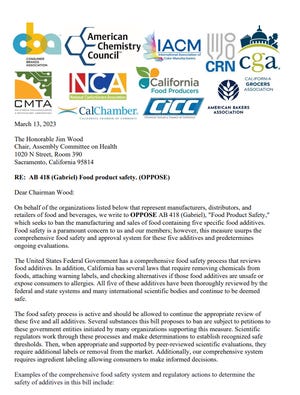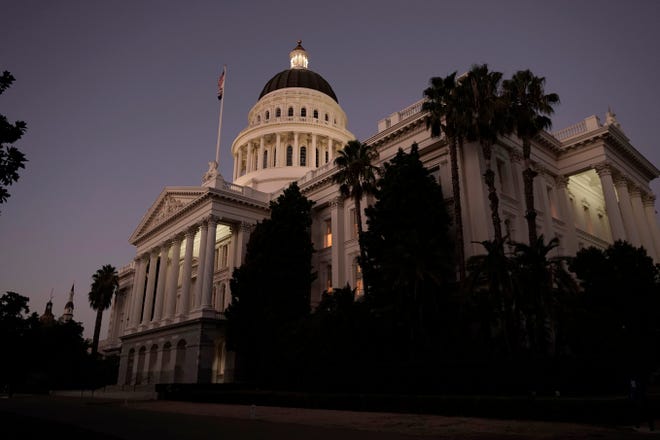California lawmakers are considering banning the manufacture, sale, or distribution of foods containing five chemicals that have been linked to health problems and are already banned in Europe.
The legislation, known as AB 418, would theoretically ban a whole host of foods, from hard candies like Skittles and Hot Tamales, to Nesquik strawberry milk and many baked goods, breads and sodas.
But the lawmaker behind the legislation making national headlines says that’s far too simplistic and highly unlikely even if it passes.
Here’s what you need to know about what the legislation is trying to accomplish and how it could have broader impacts beyond California’s state line.
The legislation
If AB 418 passes, California would be the first state in the nation to ban the following five chemicals from foods:
- Titanium dioxide, found in candies including Skittles and M&Ms, and some dairy products such as Kraft fat-free shredded cheddar cheese
- Red dye No. 3, found in Hot Tamales, strawberry Nesquik, some baked goods
- Potassium bromate, found in some white bread, flours and pizza dough
- Brominated vegetable oil, used in citric sodas including Sun Drop
- Propyl paraben, found in various baked goods, trail mixes and tortillas
Last year, a California man sued Skittles manufacturer Mars, Inc., saying the candy is “unfit for human consumption” because it contains titanium dioxide.
The company responded by saying all its ingredients are safe and used in compliance with food safety regulators.
Titanium dioxide and the other four chemicals AB 418 is targeting are all banned from European foods, and Consumer Reports is seeking a blanket U.S. ban. Red dye No. 3 has been banned from cosmetics in the U.S. since 1990 after the Food and Drug Administration said that high doses of it had been found to cause cancer in animals.
Historically, such bans don’t mean that those products get pulled from shelves. Rather, companies find other ingredients.
“I love Skittles. I eat them all the time,” Jesse Gabriel (D-Woodland Hills), the lawmaker who introduced the bill last month, told USA TODAY on Wednesday.
“There’s a 0% chance this is actually going to result in a ban of Skittles,” he said. “All we want the companies to do is switch their recipes in the same way that they’ve done in Europe, and Canada and the U.K. and Brazil and other countries that have banned these chemicals.”
Titanium dioxide:Skittles was sued for containing titanium dioxide. Plenty of other products have it too

A brewing fight
The U.S. food industry is fighting Gabriel’s legislation. Eleven different associations representing business interests wrote a letter to California Assembly Member Jim Wood (D-Healdsburg) strongly opposing AB 418 last week.
Wood is the chairman of the California Assembly’s Health Committee, which is hearing the bill on April 11.
“This measure usurps the comprehensive food safety and approval system for these five additives and predetermines ongoing evaluations,” the letter read.
The letter went on to say that the chemicals in question are safe and that “the food safety process is active and should be allowed to continue the appropriate review of these five and all additives.”
It was signed by the Consumer Brands Association, the American Chemical Industry, the American Bakers Association and the California Chamber of Commerce, among others.

Customer sues Mars: Skittles are ‘unsafe’ for consumers, lawsuit charges, because they contain ‘a known toxin’
Phthalates on the fast-food menu:Chemicals linked to health problems found at McDonalds, Taco Bell
What happens now?
If AB 418 passes in committee, it would head to the full chamber for a vote. It would then need to be approved by the Senate and signed by Gov. Gavin Newsom before becoming law.

While the legislation might not pass this session, the proposal to ban the five chemicals is likely to find support in California eventually, said Sarah Hill, a political science professor at California State University, Fullerton, who specializes in California politics.
“It would be a pretty big change and the industry is going to fight it pretty hard,” she said. “There’s going to be resistance but … it’ll work in California.”
And when that happens, it is likely to have implications for consumers in the rest of the U.S., Gabriel said.
Food manufacturers aren’t “going to have one recipe for California and another recipe for Oklahoma,” he said.
“So I think it’s likely that you’re going to have Skittles on the shelf for everyone in the United States, but they’re going to use the same recipe they do in Europe,” he said.

